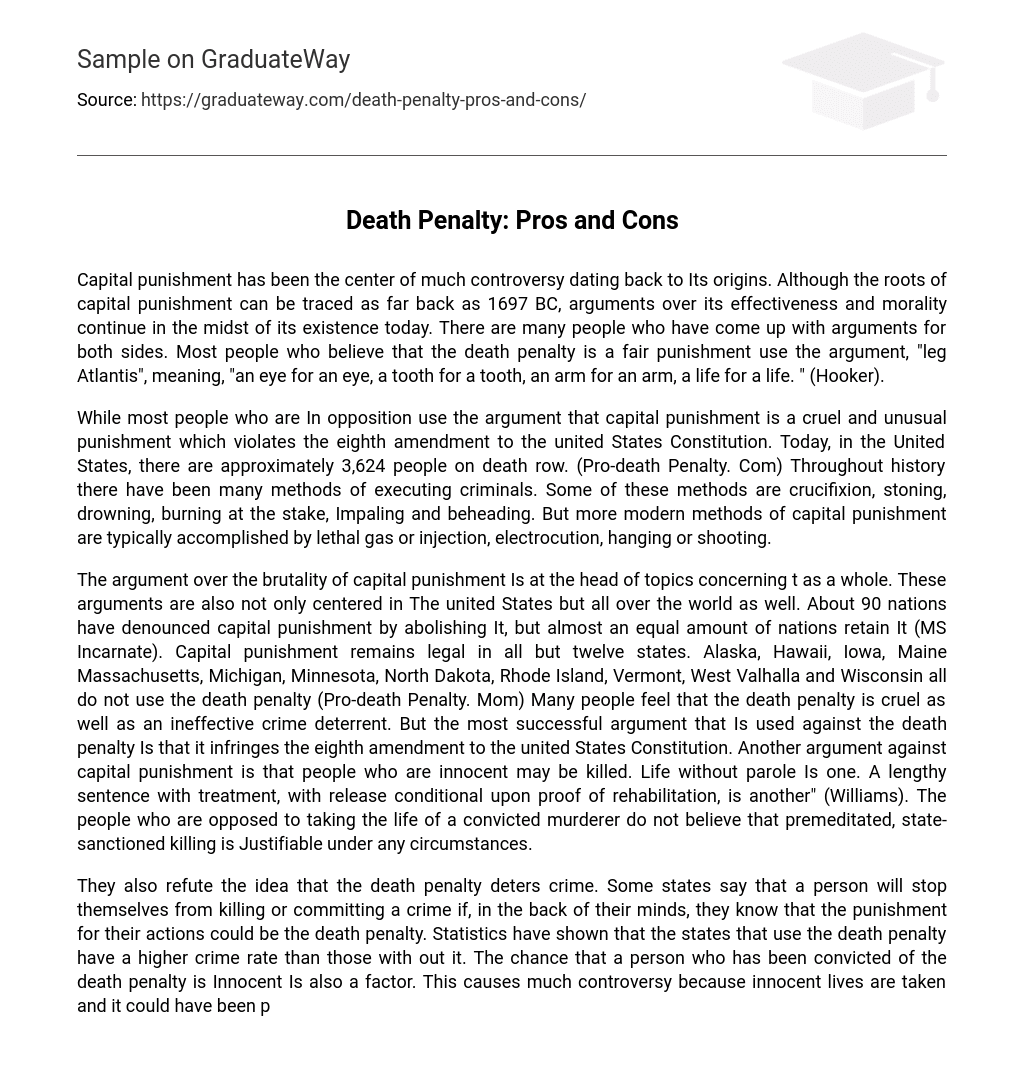Since its beginnings, the debate surrounding capital punishment has been ongoing. Discussions about its effectiveness and ethical implications continue today, despite its origins dating back to 1697 BC. Different perspectives have been presented by both sides of the argument. Proponents of the death penalty often refer to the principle of “leg Atlantis,” which advocates for equal punishment in response to crimes, such as “an eye for an eye, a tooth for a tooth, an arm for an arm, a life for a life” (Hooker).
Despite opposition and constitutional concerns, capital punishment remains in practice in the United States. Presently, around 3,624 individuals are awaiting execution on death row (Pro-death Penalty. Com). Over time, a range of methods has been utilized to carry out these sentences; from ancient practices like crucifixion and stoning to more contemporary approaches such as lethal gas or injection, electrocution, hanging, or shooting.
The issue of capital punishment, its brutality, and global impact affects numerous countries including the United States. About 90 nations have abolished capital punishment, while an almost equal number still practice it (MS Incarnate). In the United States, the death penalty is legal in all states except for Alaska, Hawaii, Iowa, Maine Massachusetts, Michigan Minnesota North Dakota Rhode Island Vermont West Valhalla and Wisconsin (Pro-death Penalty. Mom). Many argue that the death penalty is both cruel and ineffective in deterring crime. One of the most persuasive arguments against capital punishment is that it violates the eighth amendment of the United States Constitution. Opponents also highlight the risk of executing innocent individuals. Proposed alternatives include life without parole – a lengthy sentence accompanied by rehabilitation programs as a condition for release (Williams). Those who oppose taking the life of a convicted murderer do not believe that premeditated killing justified by the state is ever acceptable.
Those against the death penalty challenge the notion that it prevents crime, contending instead that some states experience higher crime rates when employing capital punishment. Moreover, the possibility of wrongful convictions in death penalty cases contributes to the continuous controversy surrounding this matter.
Opponents of the death penalty argue that when murderers are executed to illustrate the immorality of murder, it weakens the state’s moral authority. On the other hand, proponents assert that capital punishment is less severe than life imprisonment because it is timely and immediate. Ernest Van den Hag maintained that individuals are morally accountable for their actions and should therefore receive fitting punishment for their crimes (Williams). Stewart states that justice encompasses “fair treatment”.
In regards to premeditated murder, the only justified punishment is capital punishment. Anything less than the death penalty would not be proportional to murder. Emmanuel Kant argues that “even guilty-ridden killers should die in order to gain release from their anguish.” (Williams) It is unjust that a convicted murderer has the opportunity to continue living while their victim is deceased. Why is it that they have the ability to end an innocent life and then survive to narrate their actions? Execution is even more merciful compared to sentencing someone to life imprisonment.
Supporters of the death penalty argue that imposing a life sentence on a prisoner is harsher and less humane than implementing capital punishment. They claim that executing criminals not only punishes them but also creates fear among potential murderers, making it the most effective deterrent against crime.
The primary justification for capital punishment stems from the Greek phrase “leg Atlantis,” which denotes proportional retribution – trading an eye for an eye, a tooth for a tooth, an arm for an arm, a life for a life. The equity and efficacy of capital punishment are often scrutinized, inciting substantial debates where arguments from both perspectives hold considerable significance. Detractors contend that employing execution as a means of penalty is inequitable and unjust.
Those against capital punishment argue that it is not a deterrent to crime because only a small number of individuals on death row are actually executed. They claim that many criminals would be willing to take the gamble, making life imprisonment equally effective in preventing crime. On the other hand, proponents of the death penalty believe that criminals should be punished according to the seriousness of their offense and see execution as the only suitable punishment for murder. The US government has implemented various regulations regarding capital punishment.





